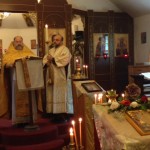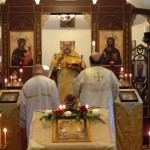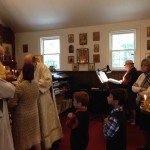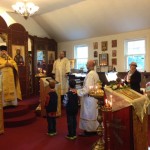On October 19, on the 19th Sunday after Pentecost, Archpriest Igor Tarasov, Rector of St. George Church served the Divine Liturgy in our temple. Following the Gospel reading he preached a homily in Russian. The English version of that homily is as follows:
“Today we celebrate 19th Sunday after Pentecost, but the Gospel lesson assigned for today is from the 20th Sunday. Today we also celebrate feast of the Holy Apostle Thomas. This is why we had two Epistle and Gospel readings.”
“St. Thomas was one of the Twelve Apostles of Christ. Today’s second Gospel lesson tells us about him when he doubted the Lord’s Resurrection but came to believe. After seeing a proof that the Lord was truly risen from the dead, after seeing the Lord’s risen body, after examining the wounds from the nails and from the spear, Thomas believed. This faith made him a fervent preacher of the Gospel. His life account says that St. Thomas went very far to the East and ended up in India where he founded Christian Church. Even today a number of Christian communities in India trace their origin from St. Thomas. Although most of them are not within the Orthodox Church, they bear witness of Christ before the pagan or Muslim society of India.”
“Today’s first Gospel lesson tells us about rising of the son of the widow of Nain. This story can be found only in the Gospel of St. Luke. It shows that our Lord Jesus Christ had a great compassion towards people. Here we have a woman who first lost her husband and now was burying her only son. In the society of those days such a woman was predestined to live a poor and miserable life. Her husband was taking care of her. When he died, her son remained her only provider. Now she lost him. This is why Jesus seeing the funeral procession and being probably told about the situation, felt for that woman so much, as every kind man would feel. But Jesus goes further than that. He comes forth and says to the widow: “Do not weep”. And He touches the coffin and says to the dead young man: “Young man, I say to you, arise.” He performs the miracle and the young man comes back to life. In that we see the difference between Jesus and any kind man. Jesus is not just a kind man, He is the Son of God, He is the Lord.”
“As the Lord Jesus Christ performed great and astonishing miracles. One of them is described in today’s Gospel. Raising the dead young man was done by Jesus to show His power over life and death. Such a power could be possessed only by the Lord of the universe, only by God who created life and who is giving it to His creatures. We also remember that Jesus raised Jairus’s daughter and Lazarus. All these events had to demonstrate the power of God given to Jesus. Finally, Jesus was Himself risen from the dead. But we should note that all three raisings of the people described in the Gospels were acts of resuscitation which is different from resurrection. They were brought back to life, but would eventually die again. But their new life manifests Christ’s divinity, and gives assurance of His Resurrection and ours, a transformation to glory. Those miraculous acts also glorify God as the Giver of life and His Son, Jesus who would be specially glorified in His Resurrection.”
“This miracle teaches us that our Lord is the Master of our life and our death. He is the source of our existence. He created us and bestowed His gift of life on every one of us. However, this gift does not seem to be enduring forever. More than that, it seems to be vulnerable and perishable. Many unpleasant things threaten that gift: illnesses, accidents, crimes, wars, stresses and so on. They all may endanger our life and cause its termination. We try to preserve that precious gift, but we often fail. Realizing such a condition we should not despair. God gave us another precious gift – a gift of faith. It is supposed to make us strong and wise during the course of our earthly life. It has to teach us to make right choices and to believe that earthly life is not the only life we possess. We believe that eternal life of the soul awaits us after death. We also believe that eternal life of the risen body awaits us after the resurrection of the dead.”
“Our faith tells us also that earthly death came to existence due to the sin of our ancestors. Adam and Eve did not have to die. God explicitly said to them when they will die: if they would eat the forbidden fruit. After eating that fruit Adam died spiritually and became subjected to physical death of the fallen and corrupted body. Only our Lord Jesus Christ, the Son of God and the Son of Man could trample death by His Resurrection. He destroyed that enemy of humanity. No one else could do it, but God. No one else could give the son of the widow back to his mother. And no one else after death can give our soul to our body again. Although death still exists and takes its toll from the sinful mankind, we all live and die with the great hope for the eternal life with God and for our own resurrection with Jesus. One day He will come and say to every one of us: “I say to you, arise.” And we will. We will begin everlasting life.”
“Dear brothers and sisters! As Jesus spoke to the dead young man in Nain, he also speaks to us in many different ways. To St. Thomas Jesus spoke saying, “Do not be unbelieving, but believing” (Jn. 20, 27). And to us He says, either “Arise” when we fall into a sin, or “Be believing” when we doubt or fall into despair. Therefore, let us cherish our faith in order to be prepared to the eternal life announced to us in today’s first Gospel lesson. Let us prepare for it by good works of faith, hope and love.”
After the Liturgy dismissal the Rector said a very brief sermon in English to convey the main ideas of his previous Russian homily.
The Rector and parishioners continued their celebration at the table enjoying delicious refreshments at the coffee hour.




